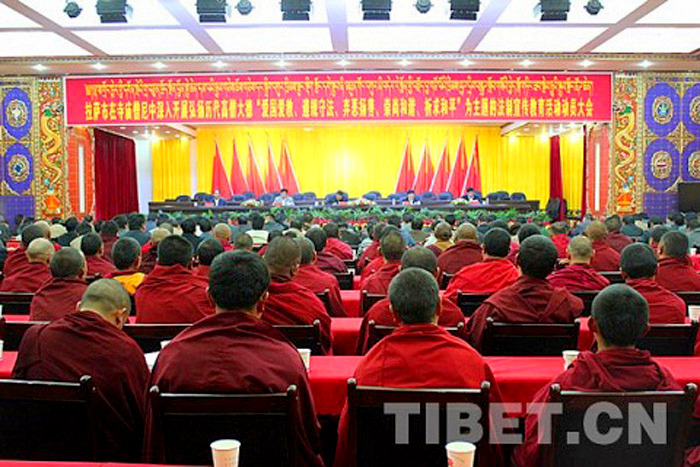 Dharamsala: The Chinese authorities in Tibet Autonomous Region (TAR) have re-launched a new wave of 'patriotic re-education' and 'legal education' campaigns targeted at Tibetan monastic institutions in the name of maintaining stability, enhancing unity, and promoting harmony in Tibet, reported the TCHRD.
Dharamsala: The Chinese authorities in Tibet Autonomous Region (TAR) have re-launched a new wave of 'patriotic re-education' and 'legal education' campaigns targeted at Tibetan monastic institutions in the name of maintaining stability, enhancing unity, and promoting harmony in Tibet, reported the TCHRD.
On the afternoon of 11 May 2012 at Lhasa, the TAR government held a meeting called "Mobilization Meeting on In-depth Legal Education Campaign in Tibetan Buddhist Temples" which marked the uniform and in-depth implementation of the Communist Party of China's (CPC) basic policy on religion and the rules and regulations passed by the State Religious Affairs Bureau in all the monasteries and nunneries in TAR, reported the Chinese government-owned website ChinaTibetNews.com.
Pema Thinley was quoted to have said that since the end of 2011, the TAR government has introduced various measures in all the monasteries to strengthen and innovate the management policy of monasteries. The TAR governor also said that the recent conferring of awards on 'model monasteries' and 'patriotic' monks and nuns has greatly aroused the enthusiasm of many monks and nuns to contribute to social harmony and stability.
Further, the TAR governor said that "Providing guidance to Tibetan Buddhism in adapting itself to a socialist society is an effective way to resist the infiltration and sabotage from the Dalai clique."
The 'patriotic re-education' campaign was first started in 1996 in a number of monasteries and nunneries in TAR. Refusal to comply with the requirements of the re-education sessions has resulted in arrests and expulsion of monks and nuns. Since 2008, the Chinese authorities have introduced the innocuous-sounding 'legal education' campaign which is now increasingly being used as a substitute semantic for the intrusive 'patriotic re-education' campaign. After the widespread demonstrations in Tibet in 2008, control over the Tibetan monastic institutions has increased with the official work teams permanently stationed to carry out patriotic re-education campaigns.
Regular religious classes are cancelled to accommodate the legal education sessions run by the work teams in monasteries and nunneries. Movement of monks and nuns are severely restricted making it difficult for monks and nuns to go outside their monasteries and nunneries and to visit other sacred monasteries and religious lamas. Sometimes, such restrictions on movement have made it hard for the monks and nuns to purchase their daily necessities including groceries. These restrictions have forced many monks to flee forcing many monasteries to close down.
On 30 September 2010, the State Religious Affairs Bureau held a meeting and issued a 44-point regulation called 'Management Measures for Tibetan Buddhist Monasteries and Temples'. Monasteries and nunneries in Tibet having sister affiliations abroad were barred from maintaining any contacts. This has severely affected the traditional spiritual ties between Tibetan Buddhist practitioners in Tibet and abroad.
Since November 2011, the Chinese authorities have begun implementing coercive programs such as ‘Nine Must Haves' and ‘The Six Ones' to regulate and restrict the activities of monks and nuns. The Tibetan Buddhist monasteries, under the Nine Must Haves program, are required to hang the portraits of four Chinese Communist leaders and the Chinese national flag in their compounds. The Democratic Management Committees which earlier used to oversee the activities of the monasteries have now been replaced by the Monastery Management Committees (MMCs), an unelected body whose staff are directly appointed by the party and the government.
Tibetan monasteries and nunneries have become a major area of crackdown for the Chinese authorities. After the introduction of a series of regulations and campaigns by the authorities, the Tibetan monastic institutions have now become a regular base for the government to publicise its political propaganda. The continued implementation of ‘forced re-education' campaigns has severely affected the normal functioning of Tibetan Buddhist institutions and the religious freedom of monks and nuns is consistently violated.


![Tibet has a rich history as a sovereign nation until the 1950s when it was invaded by China. [Photo: File]](/images/stories/Pics-2024/March/Tibet-Nation-1940s.jpg#joomlaImage://local-images/stories/Pics-2024/March/Tibet-Nation-1940s.jpg?width=1489&height=878)















